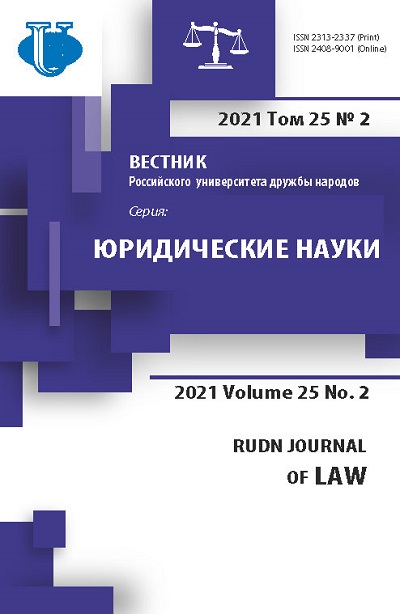Compiling a jury in Russia in the context of digitalization
- Authors: Pashin S.A.1, Bushtets N.V.1
-
Affiliations:
- National Research University Higher School of Economics (NRU HSE)
- Issue: Vol 25, No 2 (2021)
- Pages: 620-633
- Section: LAW AND DIGITAL TECHNOLOGIES
- URL: https://journals.rudn.ru/law/article/view/26717
- DOI: https://doi.org/10.22363/2313-2337-2021-25-2-620-633
- ID: 26717
Cite item
Full Text
Abstract
The purpose of this study is to conduct a comprehensive analysis of the legislation governing social relations that develop in the process of compiling a jury when considering criminal cases with a jury trial. The relevance of the research topic is determined by the expansion of the jurors’ competence from June 1, 2018. Currently, one of the main reasons for revocation of court sentences passed with the participation of a jury is violations committed during formation of a jury. In this regard, the authors highlight the main procedural and organizational shortcomings of this process and make relevant suggestions: a) to improve the legislation governing the procedure for compiling a jury; b) to compile general and reserve lists based on information included in the Unified Federal Information Register; c) to perform video recording of the process [screen broadcasting] of a random selection of citizens from the general and reserve lists by a court staff member when compiling a preliminary list of jurors; d) to stipulate the right of citizens to defer the obligation to appear in court as a candidate for jurors to a later date; e) to apply new forms of sending invitations to appear in court to potential jurors.
About the authors
Sergey A. Pashin
National Research University Higher School of Economics (NRU HSE)
Author for correspondence.
Email: os-spos@yandex.ru
ORCID iD: 0000-0003-3193-6496
Honored lawyer of the Russian Federation, retired Federal judge, Candidate of Legal Sciences, Professor of the Department of Judicial Systems and Criminal law
20 Myasnitskaya str., Moscow, 101000, Russian FederationNikita V. Bushtets
National Research University Higher School of Economics (NRU HSE)
Email: n.bushtets@mail.ru
ORCID iD: 0000-0002-7019-1389
Chief Specialist of the Center for Notary Research Foundation; post-graduate student of the Department of Judicial Systems and Criminal Law
20 Myasnitskaya str., Moscow, 101000, Russian FederationReferences
- Avdeeva, E.V. & Aksenov, A. N. (2019) Revocation of Sentences with the Participation of Jurors: Current Issues of the Criminal Procedure Regulation. Russian judge. (10), 13-18. (in Russian).
- Astafiev, A.Yu. (2019) Where does a Jury Start? Russian Judge. (4), 40-43. (in Russian).
- Astafiev, A.Yu. (2018) Socio-Legal Foundations of the Implementation of Justice on Criminal Cases with the Participation of Jurors. Administrator of the Court. (1), 26-29. (in Russian).
- Dzhabrailov, M.A. (2012) Issues of Improving the Mechanism for Jury Compilation. Russian Investigator. (22), 41-45. (in Russian).
- Gabov, A.V. & Hromova, N.M. (2016) Jury Trial in Russia: A New Reform. Judge. (5), 4-11. (in Russian).
- Gurskaya, S.N. (2016) Trends of the Development of the Legal Institution of Jurisdiction of Criminal Cases to the Court with the Participation of Jurors in the Criminal Process of Russia. Russian Justice. (4), 37-40. (in Russian).
- Jurishina, E.A. (2020) Jury Trial in Spain: Historical Retrospective, Prerequisites for Revival and Some Distinctive Features. Questions of Russian and International Law. 10(3A), 87-98. (in Russian).
- Kolokolov, N.A. (2015) The Future of the Jury in Russia: The President of the Russian Federation - Asked, the Society Answered. Criminal Proceedings. (2), 3-9. (in Russian).
- Lukin, V. P. (2004) Problems of Improving the Activity of the Jury in Modern Russia. Security of Eurasia. 4 (18), 229-243. (in Russian).
- Osipov, A.L. (2016) Issues of the Jury Compilation. Judge. (5), 29-32. (in Russian).
- Pashin, S.A. (2008) Procedural Problems of the Russian Courts with Jurors’ Participation. Bulletin of the Jury Club. (1), 43-49. (in Russian).
- Petruhin, I.L. (2009) The Acquittal and the Right for Rehabilitation: Monograph. Moscow, Prospect Publ. (in Russian).
- Tarasov, V.N. (2016) Trends and Problems of the Development of the Institution of the Jury Trial in Russia. Judge. (5), 15-19. (in Russian).
- Tisen, O.N. (2008) On the Problem of the Need for Additional Verification of Information about Candidates for Jury. Administrator of the Court. (4), 7-9. (in Russian).
- Fadeeva, E.I. (2019) Problems of Ensuring the Legal Composition of the Jury When Considering Criminal Cases. Advocate Practice. (6), 46-49. (in Russian).
- Sheremetyev, I.I. (2019) The Use of Digital Technologies in the Consideration of Criminal Cases in Court: Reality and Prospects. Lex russica. (5), 117-131. (in Russian).
- Vedishhev, N.P. (2011) Compiling a Preliminary List of Jurors. Advocate. (1), 19-28. (in Russian).
- Venev, D.A. (2016) Jurisdiction of the Court with the Participation of Jurors in the Criminal Process of Russia - Issues and Prospects. Russian Justice. (10), 50-52. (in Russian).
- Vladykina, T.A. (2018) Theoretical Model of Criminal Proceedings Considered by the Court with the Participation of a Jury. Dis. Doctor of Law. Ekaterinburg. (in Russian).
Supplementary files















